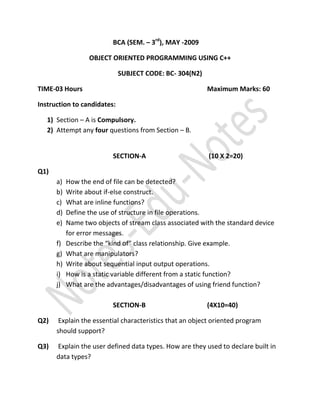2009 Punjab Technical University B.C.A Object Oriented Proagramming Language Question paper
- 1. BCA (SEM. ŌĆō 3rd), MAY -2009 OBJECT ORIENTED PROGRAMMING USING C++ SUBJECT CODE: BC- 304(N2) TIME-03 Hours Maximum Marks: 60 Instruction to candidates: 1) Section ŌĆō A is Compulsory. 2) Attempt any four questions from Section ŌĆō B. SECTION-A (10 X 2=20) Q1) a) How the end of file can be detected? b) Write about if-else construct. c) What are inline functions? d) Define the use of structure in file operations. e) Name two objects of stream class associated with the standard device for error messages. f) Describe the ŌĆ£kind ofŌĆØ class relationship. Give example. g) What are manipulators? h) Write about sequential input output operations. i) How is a static variable different from a static function? j) What are the advantages/disadvantages of using friend function? SECTION-B (4X10=40) Q2) Explain the essential characteristics that an object oriented program should support? Q3) Explain the user defined data types. How are they used to declare built in data types?
- 2. Q4) What are constructors? How to declare a constructor? List the rules while writing a constructor function. Explain with the help of an example. Q5) Define inheritance. What is the inheritance mechanism in C++? What should be the structure of a class when it has to be base for other classes? Q6) (a) Explain the difference between passing arguments ŌĆ£by referenceŌĆØ and ŌĆ£by addressesŌĆØ to functions. (b) What is meant by abstract base class? Explain. Q7) What is the difference between Static binding And Run time bindings? Explain with a suitable C++ code. ***


